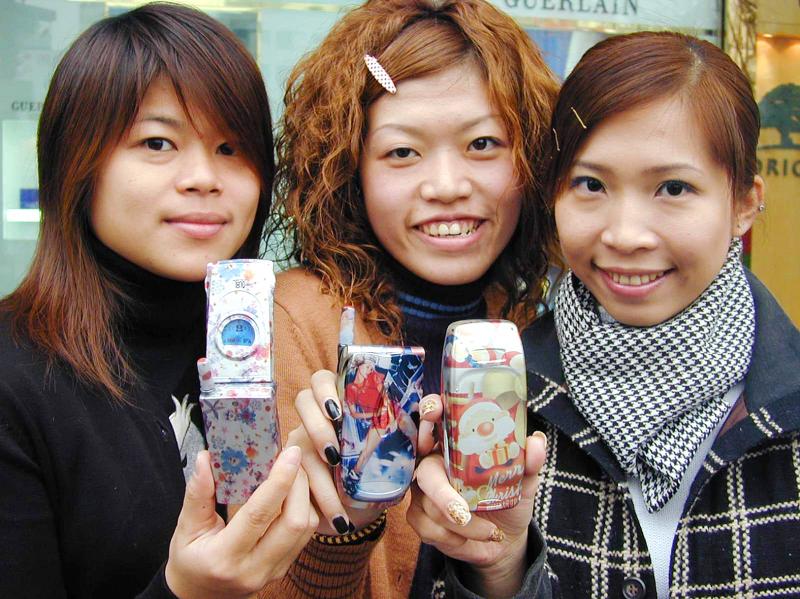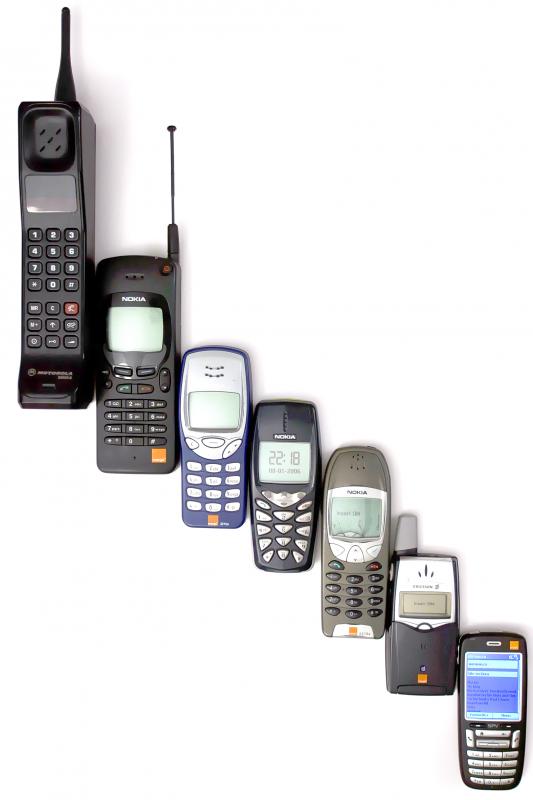Feb. 21 to Feb. 27
By the end of February 2000, Taiwan’s mobile phone users had surpassed those with landlines. It was a quick surge for the industry, as just three years prior the coverage rate was 7 percent, according to the 2001 book Covering the Sky with One Hand: The Telecommunications Wars between the Four Heavenly Kings (隻手遮天: 大哥大四天王的電信大戰) by Peng Shu-fen (彭淑芬).
By the end of 2000, it was at 75 percent.

Photo: Chang Ching-ya, Taipei Times
“Although the battle for the mobile phone market was fierce, compared to other foreign markets, [Taiwan’s] developed quite rationally,” Peng writes. “Unlike Hong Kong, for example, there was no bloody price war with no regard to costs. But even though that didn’t happen here, the competition still greatly drove down phone fees.”
The trigger to these events was the government’s opening of the cell phone market to private operators in 1997. Eight participants entered the initial fray: Far EasTone Telecommunications Co (遠傳), Mobitai Communications Co (東信), Transasia Telecommunications Inc (泛亞), Chung Hwa Telecom Co (中華), KG Telecommunications Co (和信), Tung Jung Telecom (東榮) and Taiwan Mobile Co (台灣大哥大). Tung Jung was the first to fall, bought out by KG in December 1998.
By the time of the book’s writing, Taiwan’s cell phone fees fell to among the lowest in the world. The competition also drove up customer care and service quality, leading Peng to conclude that the consumers were the biggest winners of this war. Peng added that the voice-calling market was saturated, and with the advent of 2.5G Internet the next step would be moving toward data transmission.

Photo courtesy of Wikimedia Commons
EXCLUSIVE COMMODITY
Before 1997, the Directorate General of Telecommunications had a monopoly over phone usage in Taiwan. Cell phones were extremely expensive — one could cost over NT$100,000. Even if you had the cash, there were long lines to obtain a phone number — the waiting list was up to about 1 million people by 1997. If you were desperate, you could buy a number off someone for as much as NT$50,000.
As an alternative, private companies tried to promote the CT2 system, a short-range mobile phone that used terrestrial base stations. People were excited and tempted by the companies’ inflated promises, paying in advance to reserve their spot and even hoping to run their own mini-operation through purchasing a costly personal base station.
This experiment ended in disappointment due to the limited range of the stations (a few hundred meters) and other technical difficulties such as the phone not working if one was moving too quickly. The users quickly returned their devices and the venture crashed.
The government finally passed the Telecommunications Act in July 1996, which aimed to open up the market to private businesses. The Directorate’s sales and business arm was separated into Chunghwa Telecom, with the goal of eventually becoming a private company (it made the transition in 2005).
The race was on. Taiwan Mobile started rolling out deals a month before the market opened, and reportedly had 15,000 customers signed up by opening day. The companies got innovative to compete against each other, offering all sorts of deals, special contracts and putting great effort into advertising.
There was still a gender balance in cell phone use at the beginning. A 1998 report by the Nielsen Corporation showed that 37 percent of men between the ages of 15 and 60 used a cell phone, while only 14 percent women did, although 20 percent expressed a desire to get one soon.
The report also found two main groups of users: those with higher incomes who wore the phone on their waist as a status symbol, and people such as salesmen who actually needed them for their jobs. It added that it would soon tap into the youth market.
Today only three of the original eight remain — Taiwan Mobile purchased Mobitai in 2004 and TransAsia in 2008, while KG was bought out by Far EasTone in 2010.
SHOWING OFF
By the end of February 2000, there were an estimated 12,180,000 cell phone users in Taiwan.
Of course, such a sudden proliferation of the technology brought problems, many of which persist today. Phone etiquette was a big issue, as discussed in the 2000 “Study on Improper Use of Cell Phones in Public Spaces (台灣公共空間內使用大哥大不當行為之探討) by Tseng Shih-yuan (曾士原).
Everyone who had one wanted to show off their new gadget, and they hung them by their waists and talked on them as much and as loud as they could, Tseng writes. It was not uncommon to see people slamming their large, seemingly indestructible phones onto the table as they arrived at a restaurant, yakking on them loudly throughout the course of the meal.
“If talking on the cell phone itself has become a fashionable leisure activity, or an action that one just can’t help showing off to the public, this means that our [already noisy] public spaces will have no chance of becoming quieter.” Tseng writes.
Before authorities clamped down on the practice, phones rang during class, in the library or at movie theaters — one interviewee said that he had heard at least 10 phones ringing during a screening.
This extreme visibility and showing off definitely hastened the popularity of mobile phones, Tseng writes.
“If someone calls you all the time, that suggests that your ability, importance and popularity are top notch,” Tseng writes. “When a cell phone becomes the symbol of how important you are, then even those who don’t actually need cell phones would be eager to have one too.”
Two decades later, this behavior has waned significantly, though it still persists.
Taiwan in Time, a column about Taiwan’s history that is published every Sunday, spotlights important or interesting events around the nation that either have anniversaries this week or are tied to current events.

Jacques Poissant’s suffering stopped the day he asked his daughter if it would be “cowardly to ask to be helped to die.” The retired Canadian insurance adviser was 93, and “was wasting away” after a long battle with prostate cancer. “He no longer had any zest for life,” Josee Poissant said. Last year her mother made the same choice at 96 when she realized she would not be getting out of hospital. She died surrounded by her children and their partners listening to the music she loved. “She was at peace. She sang until she went to sleep.” Josee Poissant remembers it as a beautiful

For many centuries from the medieval to the early modern era, the island port of Hirado on the northwestern tip of Kyushu in Japan was the epicenter of piracy in East Asia. From bases in Hirado the notorious wokou (倭寇) terrorized Korea and China. They raided coastal towns, carrying off people into slavery and looting everything from grain to porcelain to bells in Buddhist temples. Kyushu itself operated a thriving trade with China in sulfur, a necessary ingredient of the gunpowder that powered militaries from Europe to Japan. Over time Hirado developed into a full service stop for pirates. Booty could

Before the last section of the round-the-island railway was electrified, one old blue train still chugged back and forth between Pingtung County’s Fangliao (枋寮) and Taitung (台東) stations once a day. It was so slow, was so hot (it had no air conditioning) and covered such a short distance, that the low fare still failed to attract many riders. This relic of the past was finally retired when the South Link Line was fully electrified on Dec. 23, 2020. A wave of nostalgia surrounded the termination of the Ordinary Train service, as these train carriages had been in use for decades

Lori Sepich smoked for years and sometimes skipped taking her blood pressure medicine. But she never thought she’d have a heart attack. The possibility “just wasn’t registering with me,” said the 64-year-old from Memphis, Tennessee, who suffered two of them 13 years apart. She’s far from alone. More than 60 million women in the US live with cardiovascular disease, which includes heart disease as well as stroke, heart failure and atrial fibrillation. And despite the myth that heart attacks mostly strike men, women are vulnerable too. Overall in the US, 1 in 5 women dies of cardiovascular disease each year, 37,000 of them